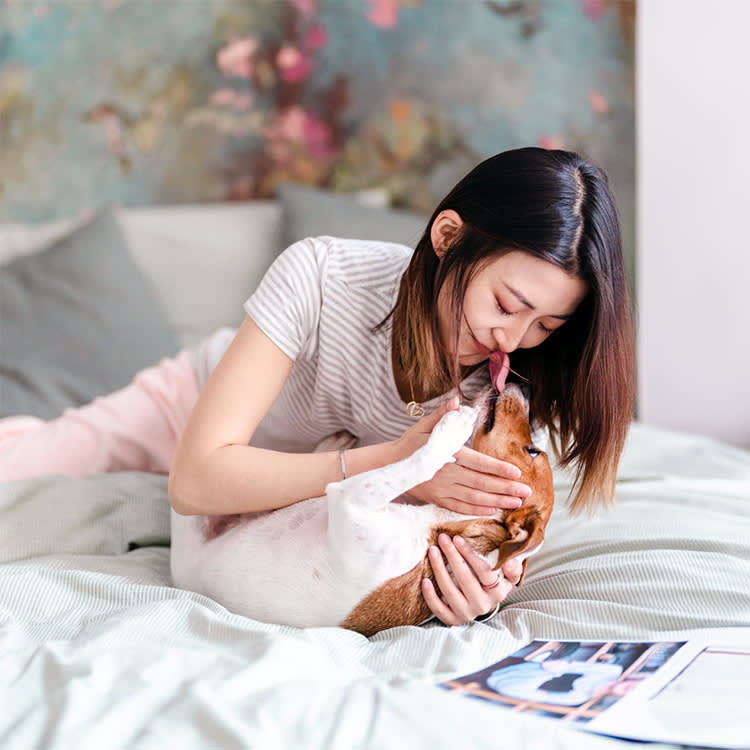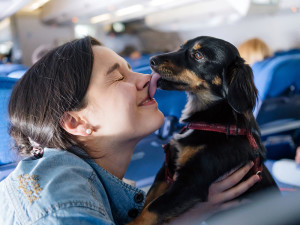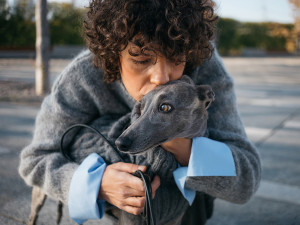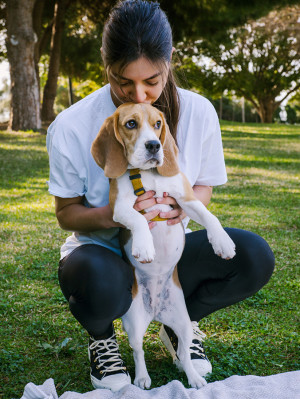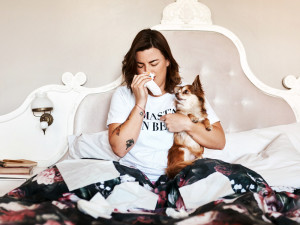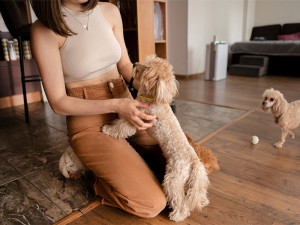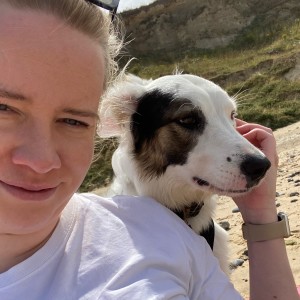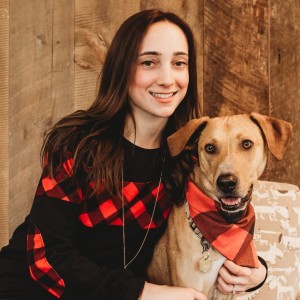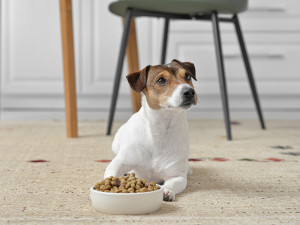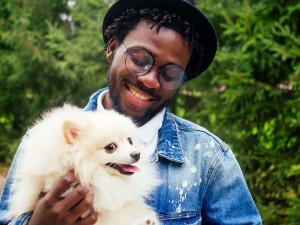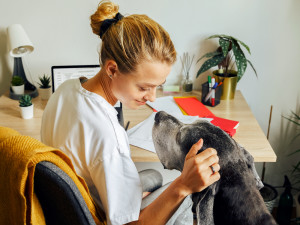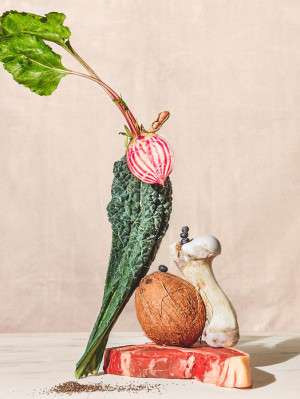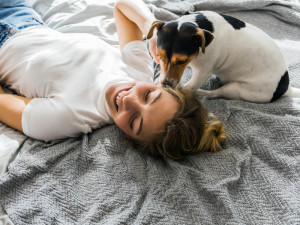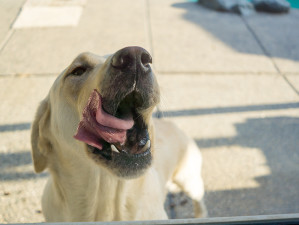Why Does My Puppy Lick My Face? (And Should They?)
And when you want to draw the line at too many kisses.
In This Article:
Why Do Dogs Lick Your Face? Should I Let My Dog Lick Me on the Mouth? When Puppy Face-Licking Becomes a Problem What Should I Do If My Dog Licks Me on the Mouth? How to Train My Dog to Stop Licking Me
A resurfaced videoopens in new tab featuring soccer player Nuno Tavares sharing a moment of affection with his two pups sparked a heated debate online in earlier this year, and raised a question: “Should we let our dogs lick our faces, lips, and even mouths?”
The video, originally posted in 2021, captured the Arsenal left-back (currently on loan to Nottingham Forest Football Club) allowing his dogs to give him kisses on the tongue and sparked a divisive conversation online as to whether you should allow your dog to get so… up close and personal.
Understanding why our dogs feel the urge to shower us with slobbery kisses is the first step in navigating their displays of affection. Why do pups want to lick us all the time? And what is the relationship between a dog’s kisses and our own health? Delve into the reasons behind a dog’s desire to lick your face; whether their saliva is as clean as they’d like us to think; and whether allowing your dog to lick your face, lips, or mouth is best practice.
Why does my puppy lick my face? (And should they?)
Typically, dog behaviors serve as a form of communication, and licking is no different. Licking may occur when your dog is excited, or showing affection, but it can also happen when your dog feels nervous. Your dog may lick to explore their environment or try something they think smells tasty. You may catch your dog licking the kitchen floor or the cement outside the ice cream shop.
Did you just finish a meal and your dog wants to lick your lips? They are probably trying to get a taste of that yummy meal you just had. Another reason a dog may lick is to show affection or grooming behavior, similar to how they show affection to the mother dog.
Sometimes, when a dog licks, it can be an appeasement or nervous behavior. Have you ever given your dog a big hug, and they seemed hesitant and licked you, looking at you out of the corner of their eyes? (This is, of course called “side-eye”: When your dog looks at you and their pupils move to the side of their eye causing you to see the whites of their eyes, sometimes called whale eye.) Your dog is telling you that they accept that affection, because they trust you but do not truly enjoy what you are doing to them, they are telling you they are uncomfortable.
Licking can also be a sign of affection. Who doesn’t love returning home for the day and your dog greets you at the top of the stairs wiggling their entire body, then they plant a lick or two on your face? It is all fun and games until you remember where you saw them putting their tongue earlier that day. Then you may think twice about letting them lick you…
Should I let my dog lick me on the mouth?
The decision to let your dog kiss you on the mouth ultimately comes down to personal preference and risk tolerance. For most healthy individuals, the risk of contracting an illness from a dog’s saliva is relatively low. However, if you fall into the more susceptible categories or have concerns about potential bacterial transmission, it’s advisable to err on the side of caution.
Pet parents should consider factors such as their dog’s diet, overall health and an individual’s susceptibility to infections. It’s crucial to strike a balance between fostering a strong bond with your dog and ensuring responsible pet parenting. If you choose to allow your dog to lick your face, establishing boundaries and practicing good hygiene can mitigate potential risks.
Here are some considerations to help you make an informed decision:
Health status: If you or someone in your household has a compromised immune system, it’s best to limit direct contact with your dog’s saliva, especially around the mouth.
Dietary habits: Dogs on a raw diet may carry additional bacteria, so be mindful of their diet and take appropriate precautions.
Personal comfort: If the idea of your dog’s kisses on your mouth doesn’t sit well with you, there’s no harm in setting boundaries. Find alternative ways to bond with your furry friend that you both enjoy.
Regular vet check-ups: Ensure your dog receives regular veterinary check-ups to monitor their overall health and catch any potential issues early.
When puppy face-licking becomes a problem
You are either team “licking” or team “No licking.” Whether you want to allow licking or not is up to you, and as always, it’s important to know the risks that may come with allowing your puppy/dog to lick you.
When pathogens are passed from their saliva
As a dog parent, you have probably seen dogs licking themselves, the couch, or the ground outside. You may have also seen dogs eat their own poop, other animal poop, old rotten food, dead carcasses, and more. Even though a dog’s mouth contains certain antibacterial enzymes that can help heal wounds it does not mean that their mouths’ are clean.
There is always a chance of contracting a pathogen from your dog’s saliva. Many pathogens your dog may have can not be transmitted from pup to human, but some can be passed on to you.
If your dog eats a raw diet
If a dog is eating a raw diet, there is a greater risk of you contracting a sickness. If your dog eats raw meat, you could contract Salmonella or E. coli. When preparing raw meals for your dog, it is always good to take extra precautions when preparing their meals. Be sure to clean the area where you prepared the food, as well as clean their bowls after each use and the area where they eat their meals. It may also be best to wait a few hours before allowing your dog to lick you after they have consumed raw meat.
If you have an open wound or sore
Another reason you should not allow your dog to lick you is when you have an open wound. Allowing your dog to lick your open wound can make you sick or in extreme cases septic. The bacteria Capnocytophaga can live inside your dog’s mouth. This bacteria does not make your pet ill but can make you sick. Most people who have come in contact with Capnocytophaga will not get sick, yet there is a chance of getting sick from this bacteria if you have a compromised immune system.
If you are at risk for serious infection
If you have a compromised immune system, it is best to proceed with caution when allowing a dog to lick your face, or anywhere on your body for that matter. If a dog has licked you, and it was unavoidable (they are just so darn cute) it is always good to wash the area a dog has come in contact with, especially if you are at a greater risk of illness.
If you have dog allergies
Then, there’s the issue of dog allergies. Not only can people be allergic to pet dander, but some people are allergic to dog saliva. If you are allergic, allowing a dog to lick you may cause an allergic reaction. You may get a rash, swelling, or become itchy. This happens because certain proteins from dog saliva may cause your immune system to react and attack those proteins as if it were a virus.
What should I do if my dog licks me on the mouth?
If your dog surprises you with an unexpected kiss on the mouth, here are some practical guidelines to help minimize potential risks to you.
Wash your face: After any dog-human interaction involving licking, wash your face thoroughly with mild soap (or face wash) and water to reduce the likelihood of transferring any bacteria.
Monitor for symptoms: Keep an eye out for any unusual symptoms, especially if you or someone in your household is more susceptible to infections.
Educate yourself: Stay informed about the potential risks associated with dog saliva, especially if your dog is on a raw diet.
Set boundaries: Establish clear boundaries with your pup to control licking behaviors. Consistent training can help reinforce these boundaries and create a healthy balance between affection and hygiene.
How to train my dog to stop licking me
It is always best to use positive reinforcement when training a behavior. Using positive reinforcement when training your dog creates a positive association with the behavior you are working on. When your dog has been reinforced positively, they are more likely to choose to do the behavior you are asking of them. When training your dog not to lick, it is important to be as neutral as possible, rather than getting angry or annoyed.
Any reinforcement — even negative reinforcement — may cause your dog to continue the unwanted behavior of licking. Yelling “no” and telling someone to stop means they should stop the behavior. Dogs do not speak our language, and if they have not been taught the word stop or no, they may think you are pulling away and saying “no” as a game. They may begin to act more silly and playful, because they think you are riling them up. So, rather than engaging with a dog when they lick you, turn away from them.
When turning away or ignoring them, you want to be neutral; this will help your dog stay positive and better understand what you are asking them to do. When turning away, go slowly, do not make any noises, and avoid eye contact. When a dog looks away from another dog it is signaling to the other dog they need a break or do not like what is happening. So, by avoiding eye contact, you are telling your dog you did not like that.
Be sure to be consistent, it is very confusing to your dog if you allow them to lick you one day but not another. If you continue to look away or ignore your dog when they lick you, the behavior will decrease over time. If turning away from them does not work, you may have to move away or leave the room completely, when doing so remember to be as neutral as possible. Your goal is not to upset your dog, your goal is to teach your dog to understand your message: When you lick me, I leave.
The age-old debate of whether to let your dog kiss you on the mouth boils down to a combination of personal preference, health considerations and risk tolerance. While your dog’s affectionate kisses are heartwarming, being aware of potential health risks allows you to make informed choices that prioritize both your wellbeing and the bond you share with them.
